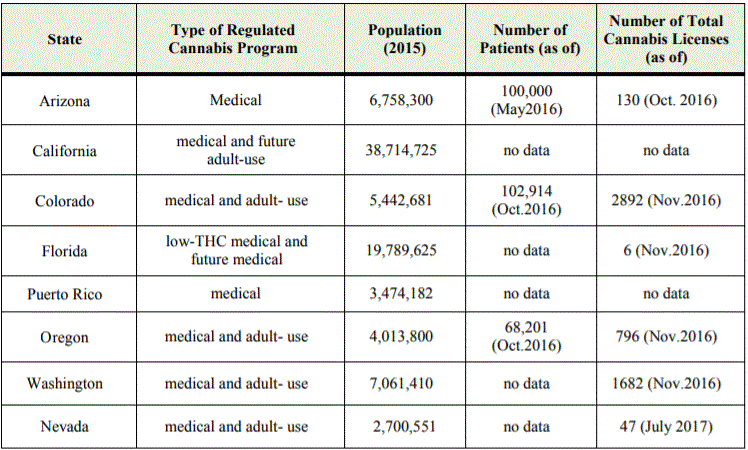United States Marijuana Industry Overview
In the United States, thirty-three states, Washington D.C. and the territories of Guam and Puerto Rico have legalized some form of medical cannabis,
and ten states (Alaska, California, Colorado, Maine, Massachusetts, Michigan, Nevada, Oregon, Vermont, and Washington), Washington D.C., and the Northern Mariana Islands have legalized recreational cannabis.
Although cannabis currently remains a Schedule I drug
under federal law, the U.S. Department of Justice issued a memorandum (the "Cole Memorandum") on August 29,
2013 to the U.S. Attorneys' offices (federal prosecutors) directing that individuals and businesses that rigorously
comply with state regulatory provisions in states that have strictly-regulated legalized medical or recreational
cannabis programs should not be a prosecutorial priority for violations of federal law. This federal policy was
reinforced by passage of a 2015 federal budget bill (passed in 2014) that prohibits the use of federal funds to
interfere in the implementation of state medical marijuana laws. Recently however, the Trump administration (and
in particular Attorney General Jeff Sessions) has indicated it may not follow, or may amend or repeal, the Cole
Memorandum. This position has added to uncertainty pertaining to cannabis within the United States, and the
division of power between the federal government and individual states in this area. Until recently, it was
anticipated that the federal government would eventually repeal the federal prohibition on cannabis and thereby
leave the states to decide for themselves whether to permit regulated cannabis cultivation and sale, just as states are
free today to decide policies governing the distribution of alcohol or tobacco.
Under U.S. federal law it may potentially be a violation of federal money laundering statutes for financial
institutions to take any proceeds from marijuana sales or any other Schedule I substance. As such, banks and other
financial institutions in the U.S. could be prosecuted and possibly convicted of money laundering services to
cannabis businesses. Under U.S. federal law, banks or other financial institutions that provide a cannabis business
with a checking account, debit or credit card, small business loan, or any other service could be found guilty of
money laundering or conspiracy. Canadian banks are also hesitant to deal with U.S. cannabis companies, due to the
uncertain legal and regulatory framework of the industry, and that most Canadian banks have U.S. affiliates.
Despite these laws, the U.S. Treasury Department issued a memorandum in February of 2014 outlining the
pathways for financial institutions to bank marijuana businesses in compliance with federal law. Under these
guidelines, financial institutions must submit a "suspicious activity report" ("SAR") as required by federal money
laundering laws. These marijuana related SARs are divided into three categories: marijuana limited, marijuana
priority, and marijuana terminated, based on the financial institution's belief that the marijuana business follows
state law, is not operating in compliance with state law, or where the banking relationship has been terminated. In
the U.S., a bill has been tabled in Congress to grant banks and other financial institutions immunity from federal
criminal prosecution for servicing marijuana-related businesses if the underlying marijuana business follows state
law. This bill has not been passed and there can be no assurance with that it will be passed in its current form or at
all. In both Canada and the United States, transactions involving banks and other financial institutions are both
difficult and unpredictable under the current legal and regulatory landscape. Legislative changes to help reduce
these challenges would eliminate these challenges for companies in the cannabis space, and would improve the
efficiency of both significant and minor financial transactions.
It remains unclear what stance the Department of Justice under the Trump administration might take toward
legalization of cannabis in the U.S., but federal enforcement of the Controlled Substances Act and other applicable
laws is possible.
Despite the legal, regulatory, and political obstacles the marijuana industry currently faces, the industry has
continued to grow.
Key Trends
The following is an analysis of market and regulatory conditions for the marijuana industry in U.S. states:

Source: Prospectus of Tidal Royalty Corp. dated January 29, 2018
Summary by States
Arizona State Summary >>
California State Summary >>
Colorado State Summary >>
Florida State Summary >>
Puerto Rico State Summary >>
Oregon State Summary >>
Washington State Summary >>
Nevada State Summary >>
Reference
Tidal Royalty Corp.'s Preliminary long form prospectus dated January 29, 2018
Agrios Global Holdings Ltd's Preliminary prospectus dated July 31, 2018